SUMMARY
This is AI generated summarization, which may have errors. For context, always refer to the full article.
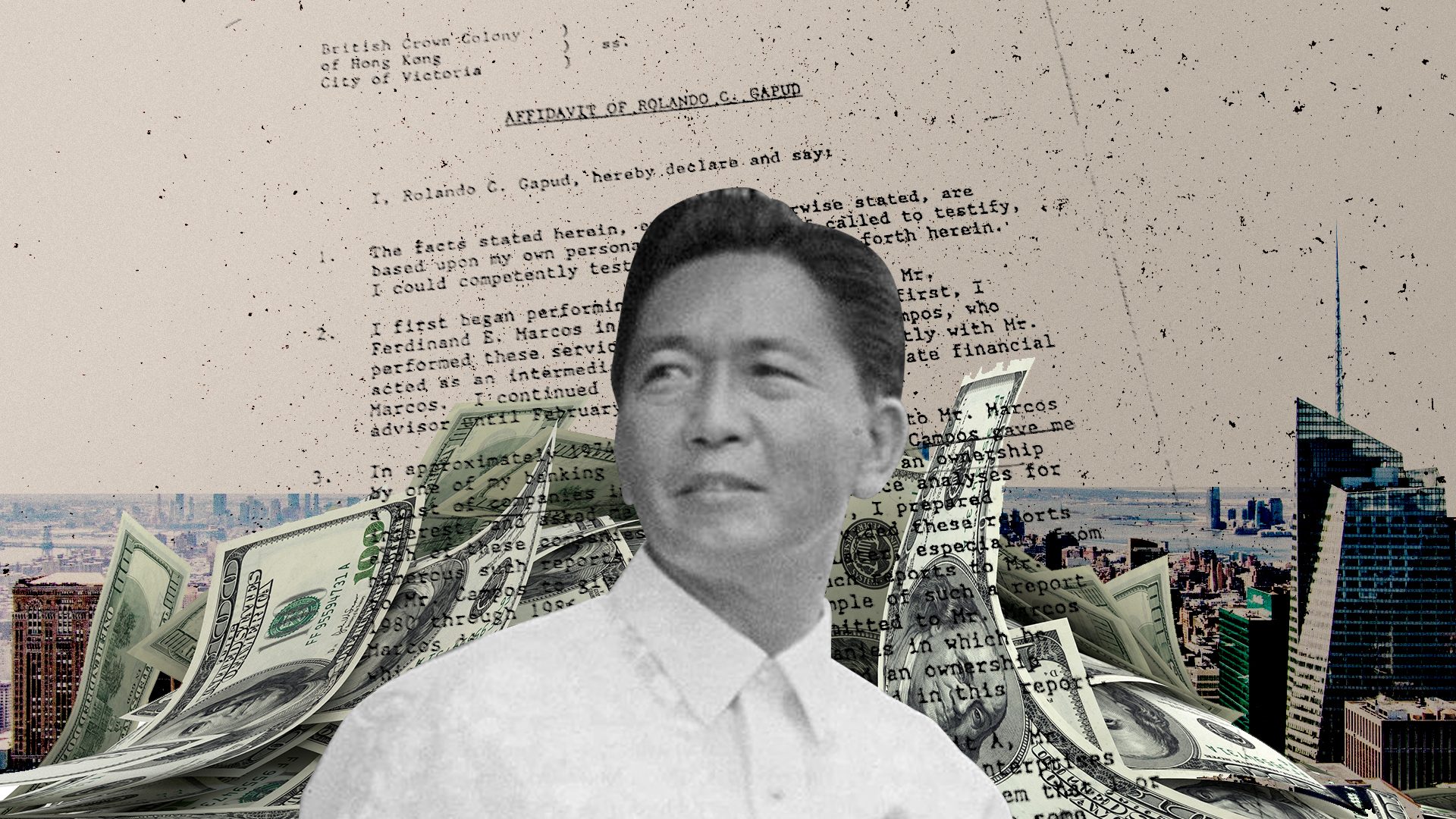
With an insatiable appetite for money, the late President Ferdinand Marcos engaged in elaborate schemes to transfer millions of US dollars from Philippine banks to his overseas accounts, all illegal transactions.
In a previous newsletter, I wrote about some of the revelations of Rolando Gapud, Marcos’ financial executor, based on Jovito Salonga’s book, “Presidential Plunder: The Quest for the Marcos’ Ill-Gotten Wealth.” (Salonga was the first head of the Presidential Commission on Good Government or PCGG.)
This time, we have more stunning disclosures, straight from an affidavit that Gapud filed with the PCGG in 1987. He detailed how millions of pesos were converted into US dollars to fund the purchase of New York properties, including an office building. Basically, Marcos blackmailed one big businessman, tapped a crony and used the Central Bank to approve these transfers.
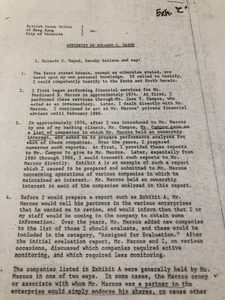
Affidavit of Rolando Gapud, Marcos’ financial executor, based on Jovito Salonga’s book, “Presidential Plunder: The Quest for the Marcos’ Ill-Gotten Wealth.” 
Enrique Razon
Here are excerpts from Gapud’s affidavit:
“Sometime prior to September 1981…Mr. Marcos instructed me to remit $30 million worth of pesos to Traders Royal Bank in connection with an arrangement Mr. Marcos had worked out with Enrique Razon. Mr. Razon owned a company which had legitimate operations in the Middle East.
“Mr. Razon told me that Mr. Marcos ordered him to seek approval from the Central Bank of the Philippines to purchase $30 million dollars for purported use in his Middle Eastern operations. The Central Bank approved the transaction based on the representation that the funds would be so used.
“The $30 million in pesos that I sent to Traders Royal Bank was then used to fund a $30 million transfer, which was used not for the purposes of Mr. Razon’s company’s Middle East operations but to purchase one of the New York office buildings. Without the misrepresentation of the Central Bank, the dollar exchange would not have been allowed.”
Rodolfo Cuenca
Another similar operation happened after this, in December 1981, upon Marcos’ instructions:
“This involved an $8 million transfer, which was accomplished by misrepresenting to the Central Bank that CDCP [Construction and Development Corporation of the Philippines] needed the dollars for its overseas operations. After Mr. Marcos and Mr. [Rodolfo] Cuenca arranged for CDCP to claim falsely to the Central Bank that their dollars were being used for CDCP’s legitimate foreign exchange needs, Mr. Marcos instructed me to remit the funds to New York in order to partially fund the purchase of one of the New York properties.”
“…Mr. Marcos and I designed these transactions to be secret, because they were illegal and had to be concealed.
“When these proceeds were converted into dollars for investment abroad, these exchanges were accomplished by misrepresentations to the Central Bank of the Philippines and thus were violations of Philippine law. In short, Mr. Marcos’ basic strategy, in virtually all crony-related transactions of which I had personal knowledge, was to conceal acts which he and his cronies knew to be illegal.”
Marcos and Cuenca were business partners. Marcos held an interest in Universal Holdings, Inc. which brought together companies owned jointly by the late president and Cuenca such as CDCP, Sta. Ines Melale Plywood Corp., CDCP Mining, and Resort Hotels Corp. Marcos owned 60% of the shares of Universal Holdings and Cuenca owned the remaining 40%.
“Much of CDCP’s business consisted of contracts it obtained from the Philippine government to provide construction services. Mr. Cuenca admitted to me that, in some instances, the contract price was inflated to allow for a kickback to be paid to Misters Marcos and Cuenca,” Gapud said.
Partner and holding company
When it came to private companies wherein Marcos held shares, Gapud said that the late dictator did this in either of two ways:
- As a partner in the enterprise of the Marcos crony who would endorse his shares “or cause others to endorse their shares in blank. The shares would then be delivered to Mr. Marcos.”
- Through a holding company which held the shares: The stockholders would endorse the shares in blank and have these delivered to Marcos.
Gapud pointed out that, in some instances, he personally delivered these shares (as partner and through a holding company) to Marcos.
While Gapud clinically narrated events that happened about 40 years ago, the shock of knowing details of illegal secret schemes that Marcos used to amass his ill-gotten wealth feels so fresh, the anger so palpable.
The Marcos children were not innocent bystanders. Imee and Ferdinand Jr. knew of their father’s vast business interests. Ferdinand Jr. said in a court testimony in 2007 that he held office in Security Bank (at least 51% of the shares were owned by Marcos) where Gapud discussed his father’s business interests with him.
Imee, for her part, put together a list of companies in 1983 where her father held shares, according to Gapud, to put order to the “scattered stock portfolio.” Imee asked Gapud “to talk to some of the Marcos partners in these businesses to assist her in collecting any outstanding share certificates and other documents of ownership.”
The thought that Ferdinand Jr., groomed by his late father to take over their stolen wealth, may become the country’s next president brings me grief. He stands against the core values we have been fighting for.
Add a comment
How does this make you feel?
![[WATCH] Bamban POGO scandal: There’s a bigger fish than Alice Guo](https://www.rappler.com/tachyon/2024/07/inside-track-tcard-bamban-pogo.jpg?resize=257%2C257&crop=435px%2C0px%2C1080px%2C1080px)
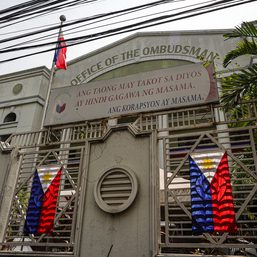


![[OPINION] What kind of citizens are we?](https://www.rappler.com/tachyon/2024/07/tl-what-kind-of-citizen-are-we.jpg?resize=257%2C257&crop=333px%2C0px%2C1080px%2C1080px)
![[Closer Look] ‘Join Marcos, avert Duterte’ and the danger of expediency](https://www.rappler.com/tachyon/2024/06/TL-trillanes-duterte-expediency-june-29-2024.jpg?resize=257%2C257&crop_strategy=attention)

![[Newspoint] A Freedom Week joke](https://www.rappler.com/tachyon/2024/06/20240614-Filipino-Week-joke-1.jpg?resize=257%2C257&crop_strategy=attention)

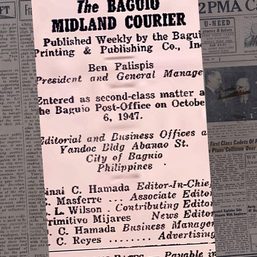


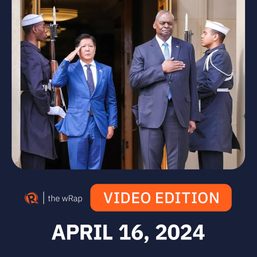

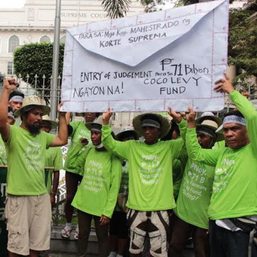
There are no comments yet. Add your comment to start the conversation.